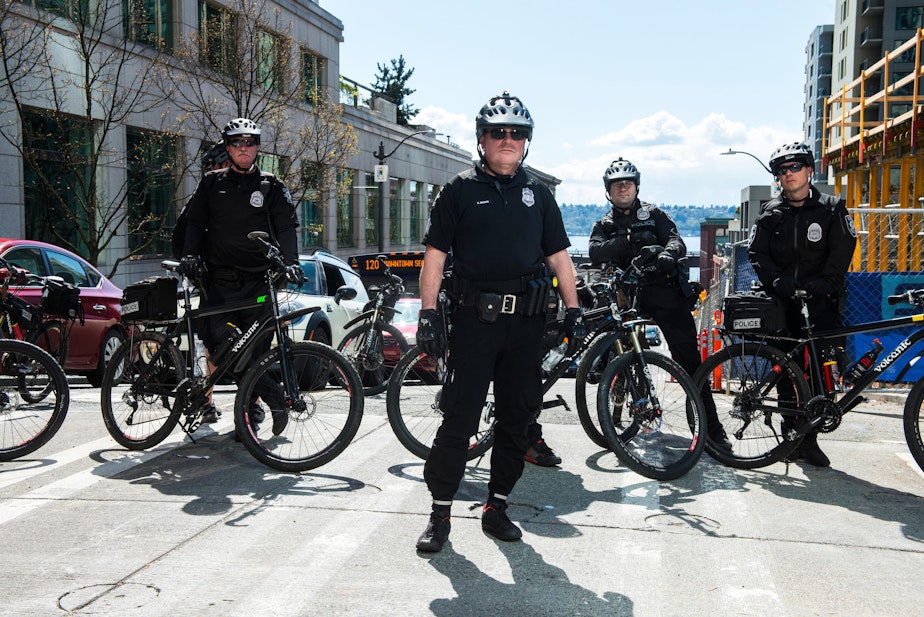Notorious 'malice' standard for cops heads to voters in Washington state

New rules could determine how police officers use deadly force.
Washington voters are about to consider new rules governing how police officers use deadly force.
Initiative 940 is on the November ballot, and it’s got backing from families of people killed by police. Police unions say the initiative would make them political scapegoats. But they also see room for a compromise.
Charging a police officer over a negligent shooting in Washington state is really hard. I-940 was developed amid a public outcry over that.
Initiative backers worked with legislators and law enforcement this year to craft a compromise version. But then the courts stepped in and put the original measure on the ballot.
Steve Strachan helped write the compromise. He’s the executive director of the Washington Association of Sheriffs and Police Chiefs. He will not be voting for this ballot measure.
Sponsored
“We are respectfully opposed,” he said. “We want to underline the great cooperation we’ve seen with law enforcement and the community.”
Strachan said the compromise clarified the deadly force rules and the obligation to give first aid in a way that brought more members of law enforcement on board. He still hopes to pass that compromise, which he called “the final draft.”
“We do want to point out that whether 940 passes or fails, we are committed to the final draft and want the Legislature to pass that either way,” he said.
In the meantime, the group De-escalate Washington is asking voters to approve the original version.
Sponsored
It would get rid of the state’s current standard for convicting a police officer with an unjustified shooting, which says the officer must have shown “malice.”
I-940 instead asks what a reasonable officer would have done in the same situation. It also requires new training in de-escalation, mental health crises, and first aid. But opponents like the Seattle Police Officers Guild say those aspects are secondary.
Sergeant Rich O’Neill is the guild’s vice president.
“This is just simply all about trying to prosecute officers,” he said. “It’s going to cause officers to hesitate and that is not good for the public and that is not good for the officers.”
But O’Neill said the guild is open to negotiating a new charging standard in the legislature.
Sponsored
“There’s hope,” he said. “We weren’t comfortable with the language that was drafted, but there’s room to come up with something that’s a little bit under — short of malice but not exactly what they agreed to.”
Seattle business owner Suzie Burke is on the board of the Seattle Police Foundation and donated to the “No on 940” campaign.
“I will vote no because I think it puts my law enforcement people at risk,” she said.
Burke said the new language is vague and would make it harder to recruit officers to Seattle.
“My biggest worry would be that we’re going to have a hard time infilling and getting the next 200 officers we need. And we need them right now,” she said.
Sponsored
One of the few law enforcement figures supporting Initiative 940 is King County Sheriff Mitzi Johanknecht. She appears in the video voters’ guide.
“The focus on prevention and training will save lives, and is good for officers,” Johanknecht said.
Washington tribes are some of the biggest donors to the initiative campaign. Seattle attorney Gabriel Galanda has also contributed money. He said he’s brought at least three lawsuits against local governments in which mentally ill Native Americans died in encounters with police.
“I would like to think that if I-940 was in effect, none of these cases would ever have needed to have been brought,” he said.
Galanda said he doesn’t expect to see more officers charged over shootings. Instead, he hopes if 940 passes — and gets funded — it would prevent deadly encounters.
Sponsored
“The point is deterrence,” he said, “and doing something that will cause a police officer in a matter of seconds or minutes to do something other than pull the trigger.”
Whatever happens on election day is likely not the last word on these issues.
If I-940 passes, the Legislature needs a two-thirds vote to amend it in the first two years. And if it fails, the Legislature could pass the compromise version with a simple majority.




